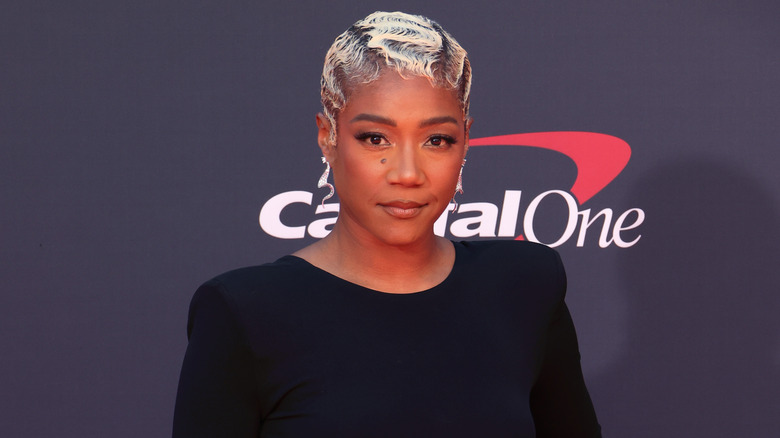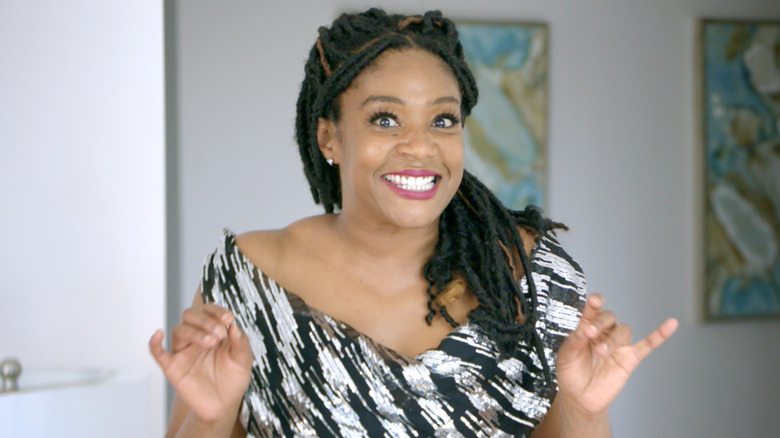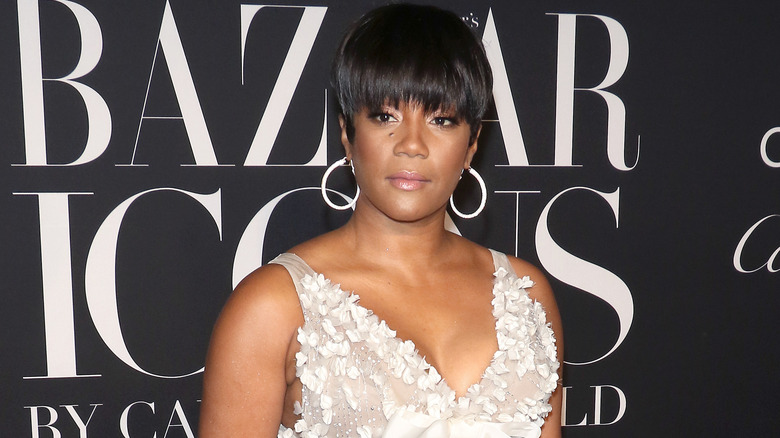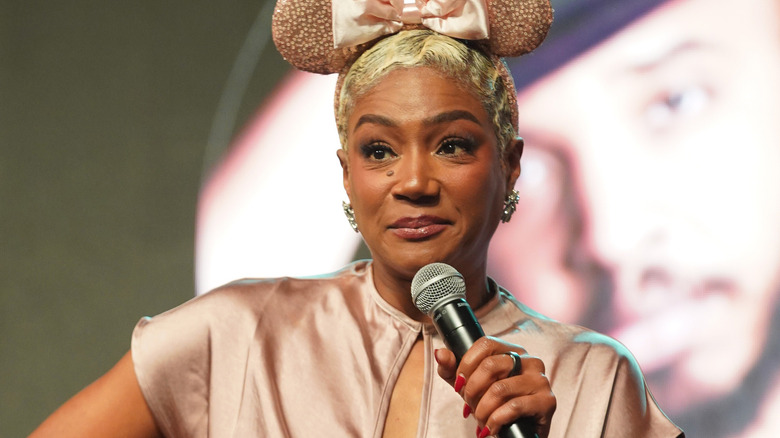What You Never Knew About Tiffany Haddish
Tiffany Haddish has carved an impressive career in Hollywood, becoming a shining beacon of success and breaking down barriers in the industry. Her rise to fame was the result of her perseverance and determination and her incredible story, from being homeless to becoming one of the most loved personalities in Tinseltown, is truly inspiring. She honed her comedic skills at comedy clubs over the years and gradually gained recognition, eventually leading to her breakout role in the hit comedy "Girls Trip," which also featured Regina Hall, Queen Latifah, and Jada Pinkett Smith. The film catapulted Haddish to fame and earned her critical acclaim that made her one of the biggest names in the genre.
After "Girls Trip," she went on to star in several films including "Like A Boss," "The Kitchen," "Between Two Ferns: The Movie," and "The Lego Movie 2: The Second Part." She even won an Emmy Award for Outstanding Guest Actress In A Comedy Series after hosting an episode of "Saturday Night Live," as well as picking up a Grammy Award for Best Comedy Album, making her only the second Black woman to ever win the award after Whoopi Goldberg in 1985.
While the charismatic and multi-talented entertainer remains an open book, there are still some lesser-known facts about her life and personality that fans might be intrigued to discover. Beyond the laughter and candid charm, there's a lot more to unpack.
The mean bullies made Tiffany richer
Tiffany Haddish has built a stunning net worth thanks to the haters who teased and belittled her. As a young girl, Haddish endured hurtful remarks and taunts due to having a wart on her forehead. In a 2017 appearance on "Good Morning America," Haddish revealed that the wart "kind of looked like a horn, and kids used to call me a dirty unicorn." The hurtful comments are enough to get anyone down, but Haddish refused to let it break her spirit. Instead, she saw a unique opportunity in adversity.
The childhood bullying Haddish experienced paved the way for her to write the book "The Last Black Unicorn." As she got older, she realized that not only could she help other people by showing solidarity and proving that anyone can overcome tough times, but she could also make a good deal of money. "I'm gonna take all the stuff the mean bullies used to say about me, and I'm going to make money off it," she recalled thinking. The book featured a collection of personal essays about her life and fame, and it went on to become a New York Times Bestseller.
And while Haddish insists she's over the bullying she received as a kid, she admitted that there was a long period in her life in which she let it affect her in all the wrong ways. "It used to hurt my feelings really bad, and I did things to myself that I probably shouldn't have," she revealed on "Good Morning America."
Her life took a turn after her mom's car accident
For comedic icon Tiffany Haddish, life took an unexpected turn at a young age when a devastating event changed her world forever. She was only 9 years old when her mother got into a car accident that left her with traumatic brain injuries that turned her into a completely different person. "She was never the same after that. She wasn't normal anymore," Haddish told People.
As the eldest child, the tragedy forced Haddish to become the main caregiver for her younger siblings despite only being a child herself. "I was basically a 10-year-old mom. I was feeding them and dressing them. I was taking care of everybody," she recalled. She also found herself having to help her mother re-learn basic tasks that come naturally to most people. "Everything my mom had taught me for the first nine years of my life, now I was teaching her," Haddish revealed.
Although it wasn't easy, she never thought their situation could get worse — until it did. When she turned 12, Haddish and her siblings were put into foster care, but she wasn't with any of her siblings. "My sisters were placed together and my brothers were placed together, but I was on my own. The social workers had to stop telling me where they were because I would just get on a bus and go to them. I felt responsible for them," she said.
She thought she'd die in foster care
Growing up in foster care encompasses a range of emotions and challenges, and it shapes the lives of those who have to go through the system. Tiffany Haddish remained in the foster care system in South Central Los Angeles until she was 18, and while she managed to defy the odds and create a successful life, she didn't always think she'd get there.
When I was in foster care, I mean, I thought I was going to die there. I didn't think I would make it to 18. And when I made it to 18, I was like, 'OK, I got to really think bigger,'" she told Variety in 2022. Since then, she's gone on to find ways to give back to those in a similar situation.
Knowing what it's like to go through such a tumultuous upbringing, the actor founded the She Ready Foundation which aims to support and help foster kids who are in need. One of her goals after achieving success was to help young people feel more grounded and less alone despite lacking a stable home. She remembered having to carry around her few possessions in trash bags when moving to new homes, which deeply damaged her sense of self-worth. Not wanting other foster kids to feel that way, she came up with a solution. "If I can reach out, I'm going to try to change that feeling for them. So I started my foundation, and we started with just giving out suitcases," she said.
An ultimatum helped Tiffany discover her talent in comedy
Ultimatums may not be the most effective or healthy way to navigate relationships and decision-making. However, it certainly worked for Tiffany Haddish when her social worker pushed her to get her act together as a young person.
While the author of "The Last Black Unicorn" enjoys much success today, life hasn't always been so sweet for her. With everything she went through, it's understandable that the actor had some behavioral issues when she was younger. However, the social worker in charge of her was at their wit's end when they told Haddish she must either enroll in psychiatric therapy or try out the Laugh Factory Comedy Camp. Perhaps unsurprisingly, Haddish chose the comedy camp, and it helped her transform her negative energy into something positive. Not only that, but while there, she was able to meet several celebrities including Dane Cook and Richard Pryor.
The two-time Emmy winner told People that the camp boosted her self-esteem and ultimately changed her life. "Going to that comedy camp and having all those men tell me, 'You're beautiful. You're smart. You're talented.' Like, for somebody to tell me that, even if they didn't believe it or mean it, it was enough. It was enough to light a fire," she said.
She used to gate crash weddings just so she could eat
There are wedding crashers out there who see it as a thrilling adventure, but for Tiffany Haddish, it was a way to eat and keep her stomach full. Long before the wedding-centered season two of the series "The Afterparty," the actor attended several in real-life. In fact, Haddish used to habitually crash wedding parties since it gave her the opportunity to enjoy a solid meal when she couldn't afford to buy food.
At the time, she was trying her hand at entering the entertainment industry and had a hard time making ends meet while living in her car. In an interview with People, Haddish admitted that she had no choice but to gatecrash some weddings in the past if she wanted to eat. "I've crashed weddings before, given a speech, and didn't know anybody there. That's when I was homeless and hungry," she confessed.
She usually went to a hotel in the Westchester neighborhood of Los Angeles that happens to be a popular wedding venue. "I would have two or three drinks, and then I would grab the microphone and be like, 'I just want to say that you are the most beautiful couple.' Everybody would be looking at me like, 'Who is this Black girl at our wedding?'" she revealed.
Thankfully, she can afford her own lavish spreads these days, no gatecrashing necessary.





